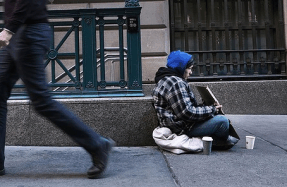Remembering Kobe Bryant

I dislike the cult of celebrity. I don’t care who stars are dating or divorcing, or what they wear or for whom they plan to vote. I often feel alienated from public rituals of grief over deaths of the famous. But this time is different. This time—with the death in a Calabasas helicopter crash last Sunday of retired Los Angeles Laker legend Kobe Bryant, along with eight others, including his 13-year-old daughter—I feel a personal loss that I am at pains to explain.
Yes, I do like basketball, and the Lakers have long been an institution in my home—I hitched myself to an Angeleno long ago. But I started watching Bryant when I was in college, well before I met my better half. Of course, his athleticism was extraordinary, but what really captured my attention was the ease and grace of his play. He was like a dancer, executing moves that, given their complexity, seemed choreographed. Bryant often accomplished the seemingly impossible on the court, and like all masters of a craft, he appeared to do so effortlessly. It was genuinely thrilling to see him in his element. Watch highlight clips of Bryant and focus on the faces in the stands: the expressions are often awe-struck, of stupefaction at whatever remarkable athletic feat he had just performed.
Other aspects of Bryant’s life, beyond basketball, had a special salience for my husband and me. He was our age. His second child was named Gianna, which is our daughter’s name, and she was roughly the same age, went by the same nickname, Gigi, and, like our daughter, loved to play basketball. Like us, Bryant was a Roman Catholic, trying to raise his kids in the faith.
And like all of us, Bryant was a sinner. Most notoriously, in 2003, he was arrested after being accused by a young woman of rape. He maintained that he had had consensual sex with her, but apologized to her publicly, acknowledging that she saw it differently, and settled out of court. It was an ugly, and career-threatening, incident, and it must remain a factor in reckoning with Bryant’s life and career. Yet so must Bryant’s response: on the brink of divorce from his wife, Vanessa, he leaned hard on his faith and fought for his marriage, publicly crediting a priest with helping him to save it.
As he got older, Bryant clearly relished being a “girl Dad” to his four daughters. He was especially devoted to helping Gianna achieve her dream of carrying on his legacy on the court. When I found out that Gianna had died with him, I felt physically ill and disoriented.
My husband and I are both philosophy professors. Academics tend to signal their disinterest in sports, as if sports were unworthy of our more enlightened attention. This attitude reveals a failure of perception, for sports can be like art, which, as Iris Murdoch attests, “affords us a pure delight in the independent existence of what is excellent” and is for that reason opposed to more selfish pursuits. Moreover, it is human to delight in what is excellent and to want to imitate it. Bryant inspired a generation of young men and women to dedicate themselves to a particular form of excellence. But he became worthy of aspiration and imitation beyond basketball because his loves became more properly ordered. In retirement, he devoted himself to his family, to the dreams of his daughters, and to God—indeed, he had taken communion with Gianna before they embarked on their fateful flight. He died with her on his way to coach her basketball team.
This past Sunday, Bryant and I were in the air at the same time, on different coasts. He was headed out with his Gianna, while I was coming home to mine. But I landed safely, and he perished. It isn’t fair that I still get to see my Gianna strive to realize her dreams and he does not. But life is neither fair nor merited; it is a gift. Kobe Bryant’s prodigious athletic talents were also a gift. We admired him because he took his gifts and fashioned from them forms of excellence that we never imagined before he revealed them to us. His celebrity was rooted in that peculiar alchemy he created on the court, but his excellence extended beyond it. Unlike many celebrities, he was not devoted to fame and attention for its own sake. For all these reasons he commanded our attention and was deeply loved, as is apparent from the widespread mourning of his loss, especially in Los Angeles.
We’ve lost more than a basketball legend or a Los Angeles icon. We’ve lost a father and a daughter whose deep love for one another was palpable. And I am not ashamed to admit that I feel a tremendous grief over it.






